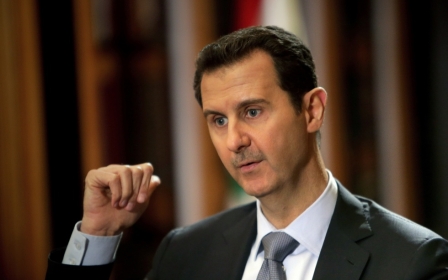Kerry warns of 'consequences' for use of chemical weapons in Syria

US Secretary of State John Kerry said he has seen “raw data” that suggests chlorine has been used in the conflict in Syria where a massive car bomb on the Syria-Turkey border killed dozens on Thursday.
“I have seen evidence," Kerry said at a press conference in London. "It’s not verified…but I have seen raw data that suggests that there have been a number of instances when chlorine has been used in the conduct of war."
Kerry's comments were shared with reporters following a meeting of the Friends of Syria, an alliance of 11 countries which has convened regularly to discuss the crisis.
On Thursday, the group was expected to talk about ways to get aid into Syria, and also discuss the political situation in the country ahead of a widely criticised presidential election in June.
Kerry said “there will be consequences” if chemical weapon use is proven, without elaborating on what that might entail.
Stay informed with MEE's newsletters
Sign up to get the latest alerts, insights and analysis, starting with Turkey Unpacked
The Organisation for the Prohibition of Chemical Weapons (OPCW) recently announced a new mission to “establish facts surrounding allegations of use of chlorine in Syria” after British newspaper The Daily Telegraph reported that a team of experts had found “sizable and unambiguous traces of chlorine” in soil samples taken from the scene of three recent helicopter attacks carried out by President Bashar al-Assad’s forces.
As the press conference concluded in London, news of the car bomb at the Turkey-Syria border emerged, with the Syrian Observatory for Human Rights confirming at least 29 had been killed – including five women and three children - and dozens more injured.
The blast took place at the Bab al-Salama crossing, which is in the northern province of Aleppo in Syria.
Horrific photos of the bomb have been posted to social media, showing charred bodies and missing limbs. Contacts close to the scene have said it bears the hallmark of a targeted attack.
“A huge bomb exploded nearby to taxis and buses, showing that this was intended to cause as many casualties as possible and the death toll is likely to rise with early reports suggesting a minimum of 50 killed and 100 injured,” said the Middle East Eye’s Sophie Cousins.
“This is a popular crossing, which journalists regularly use, and it demonstrates how precarious the situation is on the border,” she added.
Locals told Cousins that they believe the Islamic State of Iraq and the Levant (ISIL) are responsible for the bombing, but this was not verifiable late Thursday. The border has been the scene of several attacks including one in February when an explosion killed six and wounded 45.
A video posted to YouTube in the aftermath of the bombing shows a chaotic scene with people trying to put out multiple fires.
Meanwhile, the Friends of Syria meeting in London discussed new strategies to support the Syrian opposition following Lakhdar Brahimi’s resignation as UN-Arab League peace envoy on Tuesday after two years on the job without securing a solution to the conflict.
British Foreign Secretary William Hague said planned presidential elections on 3 June will be a “parody of democracy” while promising to increase humanitarian support with an extra £30m targeting areas the UN have been unable to reach.
Analysts have been quick to criticise the meeting, saying a new strategy is needed to find a solution to the three-year-old conflict.
Foreign Secretary Hague also announced the London office of the Syrian opposition has been upgraded to the status of a diplomatic mission, with Syrian opposition leader Ahmad Jarba taking part in the talks after a week of high-level meetings in Washington aimed at increasing support for the rebels in their battle against Assad.
Middle East Eye delivers independent and unrivalled coverage and analysis of the Middle East, North Africa and beyond. To learn more about republishing this content and the associated fees, please fill out this form. More about MEE can be found here.





